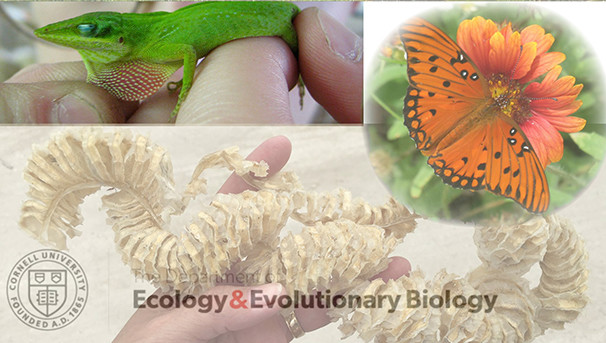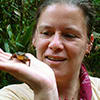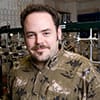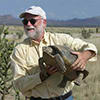Hope for the future, found on campus and beyond...
What an incredible summer this turned out to be! We not only reached our crowdfunding goal, but we surpassed the $15K mark with flying colors thanks to support from a donor roster that includes Florida course alumni and faculty, EEB alums, faculty and staff, along with Cornell supporters from all walks of life — THANK YOU!!
Now that we are heading into yet another academic year on the Ithaca campus, we are filled with pride and hope for the future. Department news headlines, and social media posts range from stories about Diversity Recruitment Weekend, to research papers about drone tech offering new ways to manage climate change, the wildly popular Shark MOOC, and articles about how EEB is at the forefront of active learning efforts at Cornell.
Our colleagues at CALS will keep this project website online for viewers to learn more about the Florida field course and the success of our campaign, but please consider staying in touch with EEB electronically. By checking the department’s main website, and our special Florida field course page, you’ll learn updates regarding the Root-Marks Fund for Field Teaching, and our 50th anniversary of field courses celebration. EEB news and current events can also be found on Facebook and Twitter—social media is a great way to stay connected to Cornell, classmates, colleagues and our department.
With sincere gratitude,
Christine
Christine Bogdanowicz, Department of Ecology and Evolutionary Biology, Cornell University


A global community, rooted in the Florida scrub...
The alumni roster from the "Florida field course" not only spans the globe, but extends well beyond academia. The list of institutions and organizations where course alumni currently work and study is diverse and inspiring: UCDavis, Eastern Michigan University, Patuxent Wildlife Research Center, National Human Genome Research Institute, UNESCO Institute for Water Education, RIT, Berkeley, Roskilde University (Denmark), Bowdoin, Cornell, The Rocky Mountain Institute -- and, on and on. Each one of these alumni made a contribution to the history of the course -- we are now hoping that this global community joins together in making our crowdfunding campaign a total success! Every donation truly makes an impact; no matter the amount -- each gift becomes a fiber in the tapestry of our efforts to send EEB grad students out into the field, a tapestry with a pattern as lovely as the wing of this Florida scrub dragonfly. Photo thanks to Florida course alum, and current EEB graduate student Karin van der Burg.

Close encounters of the tortoise kind!
Meet one of the Gopher Tortoises being monitored at Archbold. Tortoises need open, sunny spots for nesting and sun-loving food plants, like grasses. This large male tortoise occupies a burrow nearby in low, open sandhill vegetation maintained by fire. He was spotted mowing the grass and eating fallen fruits, like this Hog Plum (Ximenia americana), along a firebreak. The Gopher Tortoise is listed as a state-threatened species. This video features footage from a project funded in part by Disney Conservation Fund; produced by Into Nature Films in collaboration with our colleagues at Archbold Biological Station. "Our Florida course students appreciate and encounter these ecosystem engineers along with other species that share the burrows and the burrow apron," explains course instructor and project team leader Kelly Zamudio. Learn more about BioEE 6602, and the history of the Cornell's connection to Archbold -- help us celebrate 50 years of field ecology!
It’s all about place; it’s all about nature!
Harry Greene says...Good teaching combines an air of spontaniety with careful, goal-centered planning, and from it's beginnings with Dick Root and then Peter Marks, continued through Jed, Harry, and Kelly, that's been true of the Florida field course. It's all about a place, it's organisms, and gaining confidence in asking questions about nature, and we undertake particular activities with those goals in mind. One of them involves a morning walk and lecture with John Fitzpatrick, a sustained introduction to an absolutely core organism of this locale, one that Fitz has spent much of his life studying and whom we get to meet very directly--I'm confident students and faculty return for lunch from this particular sojourn with an enlarged view of the Florida scrub and its endemic Jays! Learn more about the endangered Florida Scrub-Jay and watch the video in which course alum, Nancy Chen explains: “Our results are making us rethink conservation priorities in the future.”
$10
Minnow Minion
Be part of the class; no donation is too small, and yes--every little bit counts! From poster boards to bug repellent, consumable supplies are needed each and every field season.
$25
Boxelder Buddy
Help grads take root in the field! Sampling vials, baggies and bins help grad students keep track of specimens collected in the field and brought back to the lab for ID and examination.
$50
Scrub-Jay Sidekick
Send a student to the scrub with plenty of grub! Humans, birds, reptiles and the like all require food and water to go about their day; your gift will help purchase edibles and potables for our grad students and mentors.
$100
Tortoise Team Member
Slow and steady wins the race. 50 years of field courses is a milestone we are very proud to celebrate; your contribution will enable our field programs to withstand the test of time.
$250
Possum Partner
The essence of science is best understood when completely immersed in the sights and sounds of nature. Your gift will help us purchase durable goods such as binoculars and sound recording devices--both essential tools for ecological field work.
$500
Everglades Explorer
Destination; Everglades: Load up the van, pack the lunches and sampling gear because our students and mentors are ready to explore the Everglades thanks to your incredible generosity!
$1,000
Eco-booster
Your gift to our programs stretches far beyond Cornell's scientific community. Time spent in the field with peers and mentors enriches the academic careers and personal lives of all involved--thanks to your overwhelming generosity--these experiences will continue into the future.





